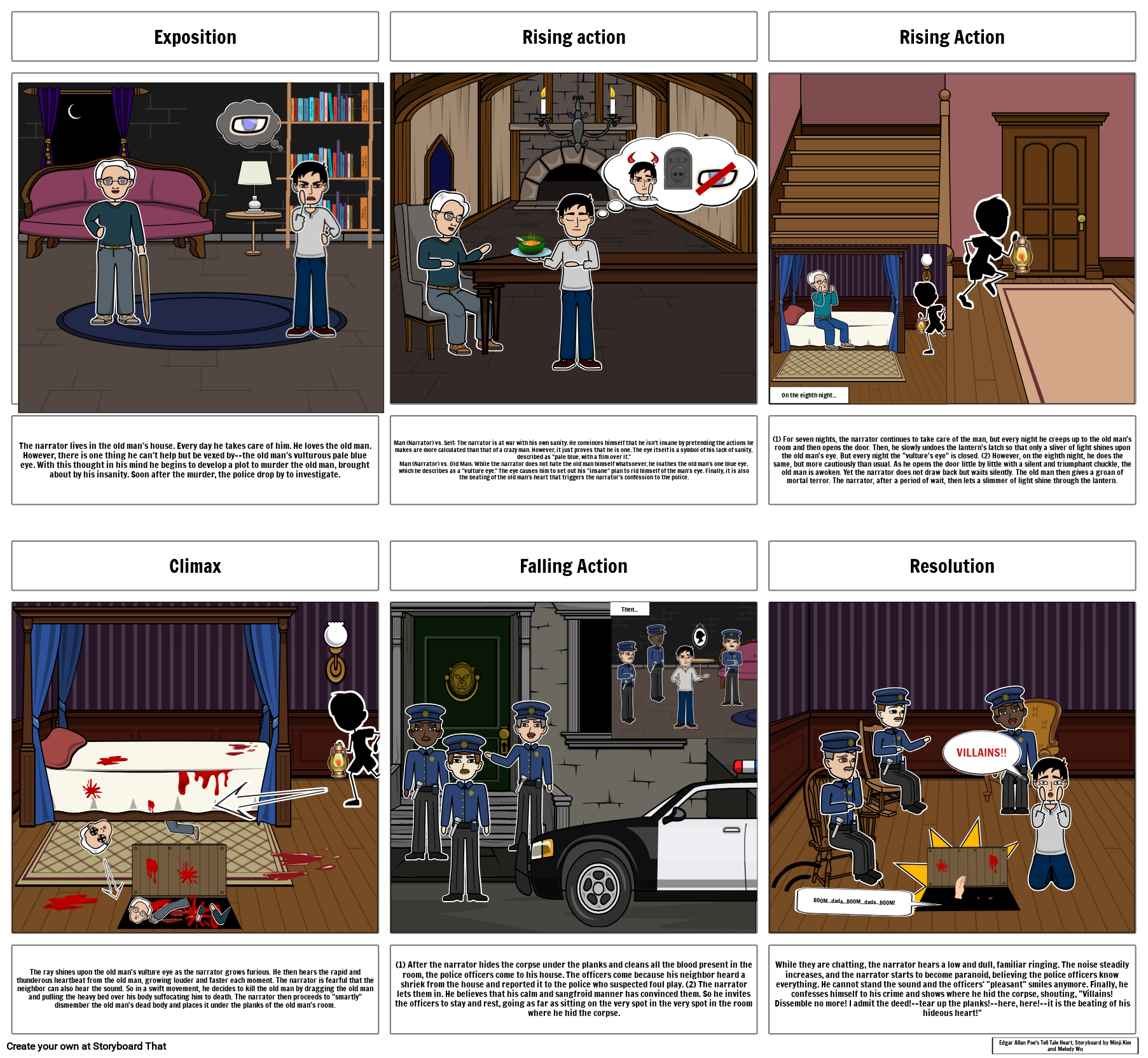Untitled Storyboard

Süžeeskeem Tekst
- Libisema: 1
- Exposition
- The narrator lives in the old man's house. Every day he takes care of him. He loves the old man. However, there is one thing he can't help but be vexed by--the old man's vulturous pale blue eye. With this thought in his mind he begins to develop a plot to murder the old man, brought about by his insanity. Soon after the murder, the police drop by to investigate.
- Libisema: 2
- Rising action
- Man (Narrator) vs. Self: The narrator is at war with his own sanity. He convinces himself that he isn't insane by pretending the actions he makes are more calculated than that of a crazy man. However, it just proves that he is one. The eye itself is a symbol of his lack of sanity, described as "pale blue, with a film over it."Man (Narrator) vs. Old Man: While the narrator does not hate the old man himself whatsoever, he loathes the old man's one blue eye, which he describes as a "vulture eye." The eye causes him to set out his "insane" plan to rid himself of the man's eye. Finally, it is also the beating of the old man's heart that triggers the narrator's confession to the police.
- Libisema: 3
- Rising Action
- On the eighth night...
- (1) For seven nights, the narrator continues to take care of the man, but every night he creeps up to the old man's room and then opens the door. Then, he slowly undoes the lantern's latch so that only a sliver of light shines upon the old man's eye. But every night the "vulture's eye" is closed. (2) However, on the eighth night, he does the same, but more cautiously than usual. As he opens the door little by little with a silent and triumphant chuckle, the old man is awoken. Yet the narrator does not draw back but waits silently. The old man then gives a groan of mortal terror. The narrator, after a period of wait, then lets a slimmer of light shine through the lantern.
- Libisema: 4
- Climax
- The ray shines upon the old man's vulture eye as the narrator grows furious. He then hears the rapid and thunderous heartbeat from the old man, growing louder and faster each moment. The narrator is fearful that the neighbor can also hear the sound. So in a swift movement, he decides to kill the old man by dragging the old man and pulling the heavy bed over his body suffocating him to death. The narrator then proceeds to "smartly" dismember the old man's dead body and places it under the planks of the old man's room.
- Libisema: 5
- Falling Action
- Then...
- (1) After the narrator hides the corpse under the planks and cleans all the blood present in the room, the police officers come to his house. The officers come because his neighbor heard a shriek from the house and reported it to the police who suspected foul play. (2) The narrator lets them in. He believes that his calm and sangfroid manner has convinced them. So he invites the officers to stay and rest, going as far as sitting on the very spot in the very spot in the room where he hid the corpse.
- Libisema: 6
- Resolution
- VILLAINS!!
- While they are chatting, the narrator hears a low and dull, familiar ringing. The noise steadily increases, and the narrator starts to become paranoid, believing the police officers know everything. He cannot stand the sound and the officers' "pleasant" smiles anymore. Finally, he confesses himself to his crime and shows where he hid the corpse, shouting, "Villains! Dissemble no more! I admit the deed!--tear up the planks!--here, here!--it is the beating of his hideous heart!"
- Libisema: 0
- BOOM...dada...BOOM...dada...BOOM!
- Edgar Allan Poe's Tell Tale Heart, Storyboard by Minji Kim and Melody Wu
Loodud üle 30 miljoni süžeeskeemi

